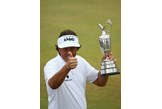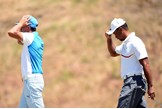Phil Mickelson’s psychiatrist knows what it takes to win The Open
Published: Last updated:
Michael Lardon is one of the world’s most highly regarded sport psychiatrists and has worked with elite athletes in a plethora of sports. Within golf, he has helped David Duval, Rich Beem, Michael Campbell and Phil Mickelson win Majors. Lardon was interviewed by 888sport ahead of this year’s Open and gave a breakdown of what you need to do if you want to lift the Claret Jug. His tips may just help you get through your next monthly medal in one piece, too.
How to prepare for the opening round
The good news with St Andrews is that it has one of the widest greens I’ve ever seen on an opening tee shot. To think of Ian Baker Finch nearly hitting it OB those years ago is pretty amazing. It’s very different to many courses in that it’s very forgiving off the tee. But St Andrews is so much about the weather and you could be playing twenty different golf courses so you have to prepare for it. There is a saying – Life is ten per cent what happens to you, ninety per cent how you deal with – and if there is one sure thing in a major it’s that you will hit a great shot but get a bad lie. If you end up in one of those coffin bunkers take your medicine as part of the gig. You’re going to get burned sometimes and how you react to those things is critical. You have to remain cool, calm and collected because you will be facing adversities.
How to handle a dream start – or a nightmare one
You have to understand that every human being has freewill. So we have the choice to think in certain ways. Let me use Phil as an example. If he bogeys the first hole one of his raps is “Well that usually means I’m going to have a good round”. I don’t know statistically if that’s true but if he thinks it’s true I love it.
Another great adaptive thing he’s got going is that he says, “I don’t worry if I make a bogey here and there because I always make five or six birdies.” Now that’s a great way to think about it.
Let’s look at the flip-side where a player sets off great and is on the leaderboard. He doesn’t want to think ‘Well that must mean a bogey is due’ or start to feel the pressure. You have to be adaptive and think ‘Ok today I’m in the zone so I’m going to burn through everything’. This is the highest level and those guys are coming after you so you have to put every birdie in the bank because you’re going to need it later. You don’t get comfortable until you’re having a beer on the nineteenth.
How to deal with a hole you’ve previously struggled with
We certainly see this. If there is a particular hole you spend some time on it before the tournament. When Phil won the British Open he had gone out to the 17th and he practised that shot firing those 3 woods in there and making the putt from the front to the back of the green. So when the day came he was more comfortable.
I say to the players ‘Let’s make this hole our girlfriend. Let’s have some fun with it’ rather than building it up as an ominous bad thing.

How to approach an easy par 4 where everyone else is making birdie
Let’s say the stroke average of that par 4 is 3.6. You may be thinking ‘If I make par I lose a half a stroke to the field’ but you can’t think like that because it’s a waste of energy and not adaptive. Your job out there is to execute golf shots and what I care about is the thirty seconds of the 69 times you think very carefully about your pre-shot. Take a moment – and this is what amateurs don’t do – to really create the shot. Whether that is seeing it or feeling it. We don’t want to just go in there and swing. We want to have some intention.
If your playing partner is having a nightmare
It makes me think of round one of Chambers Bay when Ricky Fowler and Louis Oosthuizen were playing with Tiger and they all shot a million. Ricky grew up idolising Tiger Woods and now he’s playing with him and Tiger is playing bad. Maybe subconsciously it gives you permission to play badly too instead of focussing on the bigger picture – the tournament and your own game and why you’re there. You get pulled into that vortex.
You need to say things to yourself proactively such as ‘That’s his thing today. I’m sorry for him but that’s not my job right now. My job is execution, staying in my bubble, and doing my pre-shot trigger’ and take your time. Just like with bad weather when you make sure your grip is dry and double-check things.
It’s another variable in the equation that can take you away from what you need to do.

Dealing with the adrenaline/nerves on the final back nine and the threat of being overwhelmed by the possibility of glory
When I start with somebody I ask them similar and there are two attitudes out there. The right attitude is ‘Well this is what I play for. I came here to be in contention on the Sunday on the back nine…how much fun is this?!’
Not everyone is like that and some can feel overwhelmed. If that’s the case we need to prepare for it. They’re going to feel nervous because they’re supposed to feel nervous. That’s a good thing. It increases adrenaline and they will hit a little further. Their caddy and the player needs to factor that in and maybe club down and then just embrace it. Let’s have some fun with the pressure. Let’s perform better with it rather than see it as oppressive.
Michael Lardon is technology company GAME GOLF‘s resident sports psychologist.



